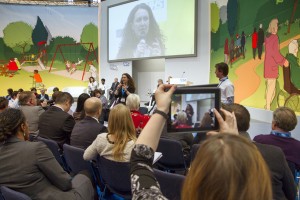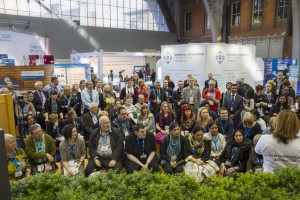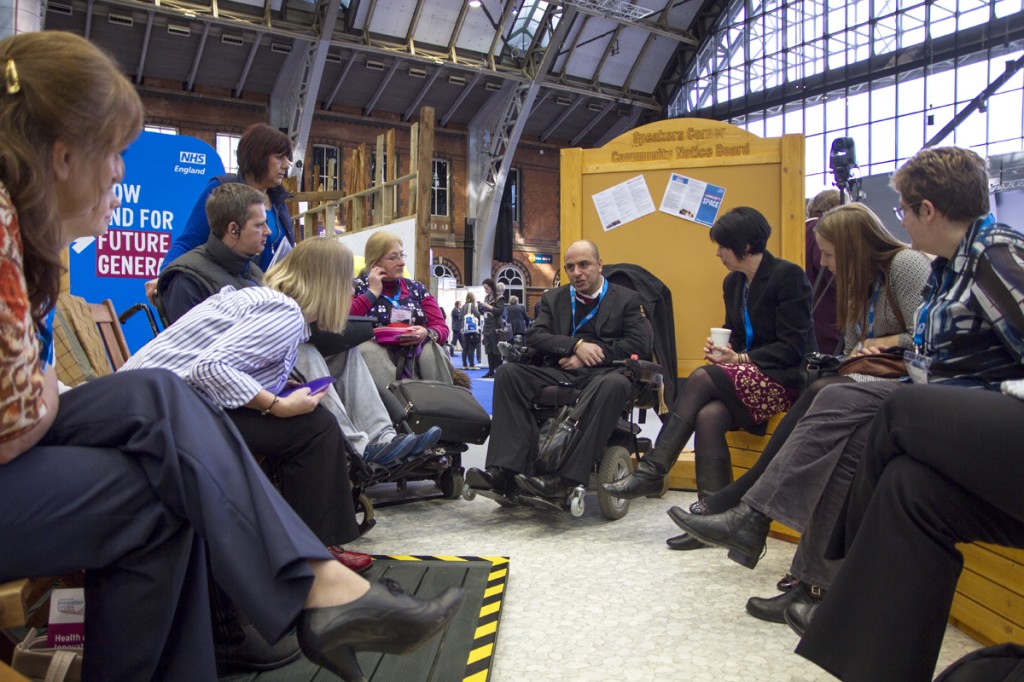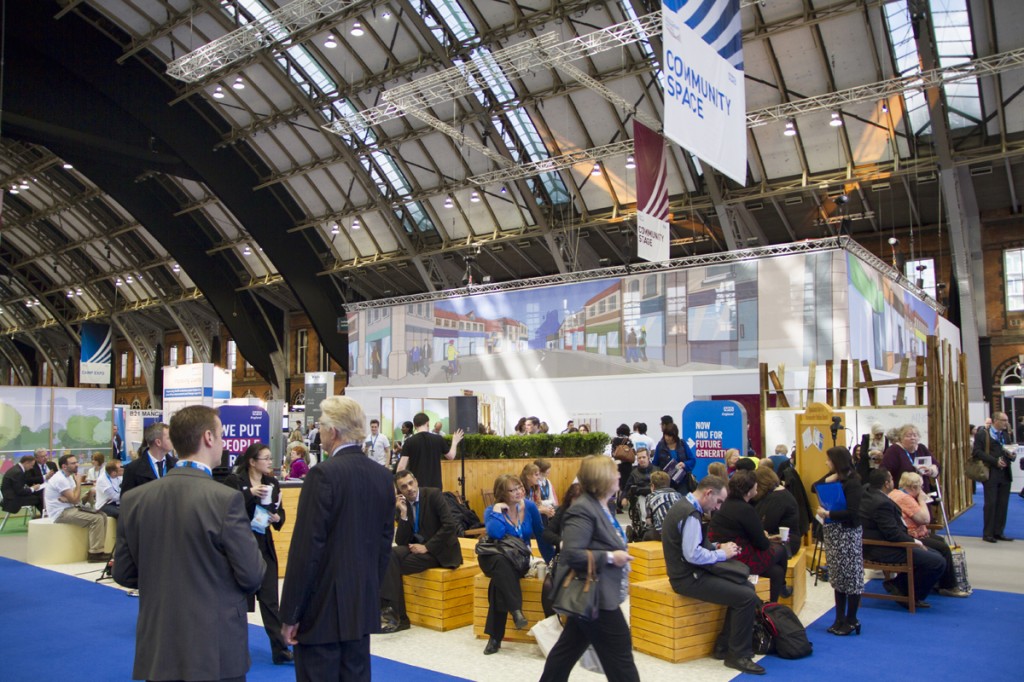NHSCitizen: reflections and learning from Expo 14
These are just a few of my personal reflections from two days at the Health and Care Innovation Expo 2014 – apologies if I go on a bit it’s because the richness and depth of the experience was so powerful for me. In previous years the suited and booted ‘cognoscenti’ have gathered and convened to show each other how great their ideas and solutions are. This year we wanted it to be different – we wanted to live the values we espouse of ‘putting patients at the heart of everything we do’.
What did we try to do?
- We tried to learn the lessons from the Future of Health Peoples Panel – they are the best judge of how we managed to do this and we will be asking for their feedback and critique to help us develop these approaches as we move forward
- We involved people with lived experience – patients, service users, carers: to co-design and co-deliver University sessions; to contribute their expertise to the set piece staged talks; to the design of the event specifically the community space; to advise on the accessibility of the whole event.
- We engaged with voices from across the sectors – health, care, academics, voluntary sector – embracing and recognising the expertise outside the ‘usual suspects’ to create a learning culture that recognises the assets available outside and within the NHS
- We tried to put the voice and experience of people into the essence and ethos of Expo 14
What did this look like?
What did this feel like?
“People with learning disabilities felt empowered, included and respected and we all really LOVE working with all of you! Thank you so much for giving us the opportunity to be involved in such a real non tokenistic way.”
Change People, Leeds
What did we do?
We had loads happening all of which combined, I felt, gave the citizen participation a real depth and genuineness that I haven’t really felt at any other conference of this ilk.
- Participation Awards – celebrating peoples contributions
- University Sessions – building and sharing knowledge and understanding
- The Community Space – open space for sharing stories and ideas
- ‘Living Room’ and ‘Community Stage’ sessions – presenting concepts and debate
All of these elements contributed to the #NHSCitizen conversations – encouraging people to share what’s important to them, what are the issues they want to develop and how do they see them being addressed. The community space was used throughout the two days to open up conversations and encourage people to identify the issues and ideas of most concern to them – the gather space.
A Community Stage session was used to ‘launch’ the story so far. We tried to construct a session that engaged people with NHS Citizen as a ‘work in progress’ that was still malleable and in formation. I was interested that lots of people have leapt to the solution of an ‘organisation’ with a ‘committee’ and a ‘chair’ – very traditional,  organised and ‘safe’ responses that help us to make sense of an extremely difficult concept. I don’t believe that NHS Citizen should be this – I think it has to be a far more powerful form of association – a social network of networks that mobilises people and allows for a connected dialogue in the round rather than assigning powerful roles to worthy individuals.
organised and ‘safe’ responses that help us to make sense of an extremely difficult concept. I don’t believe that NHS Citizen should be this – I think it has to be a far more powerful form of association – a social network of networks that mobilises people and allows for a connected dialogue in the round rather than assigning powerful roles to worthy individuals.
Key reflections
Collective conversations: the power of listening to each other across diverse and often never heard communities – we talk a lot to many different groups and communities. We talk to young people, older people, people from minority communities etc… etc…. Rarely do we all talk, listen and hear together
Preaching to the converted: I don’t think we really connected with the ‘mainstream’. For all the profile and visibility in the presence of ‘people’ and the centrality of the community space I don’t think we managed to draw in the sceptics or the unconvinced. We need to work harder to really connect with a wider range of clinicians and NHS Staff to connect our approach with their world in a way that they feel is useful and adds value to their work.
The Community Space was a hive of activity. It was messy and chaotic. It might have appeared a bit disorganised and was probably quite intimidating for those not involved. It was centred around people, conversations and the issues that mattered to them. We weren’t trying to sell a product but we were trying to tell stories and share experiences. It was about people’s lives and people’s lives can be a bit messy!
Depth of conversation, speaking truth to power: the test Assembly meeting drew a diverse and fascinating crowd. The size of the crowd was fantastic but it also then limited the contributions people could make. Tim, Victor and Ciaran really connected with the conversation in an open and genuine way. I felt some difference between the Executive and the Non-Executive responses. The Executive response heard the truth as spoken but leaned more to responding with (I generalise) ‘this is what we’ve already done’ and more standard corporate lines. Whereas, the non-executive responses were more open and exploratory with less corporate and more personal ownership in their answers.
 Talking in the round participants really connected with one another as well as with the Board members. There was a buzz and an energy as ideas developed and were built upon being endorsed and recognised by those in powerful positions. This was concluded with the strong commitments made by each Tim, Victor and Ciaran to take action as a result of the issues and ideas raised.
Talking in the round participants really connected with one another as well as with the Board members. There was a buzz and an energy as ideas developed and were built upon being endorsed and recognised by those in powerful positions. This was concluded with the strong commitments made by each Tim, Victor and Ciaran to take action as a result of the issues and ideas raised.
Our next challenge is to really engage the wider membership of the whole Board with the next Assembly – hopefully at the AGM in September 2014.
For more information and to keep in touch visit NHS Citizen.
“As a carer I often feel invisible and unimportant. I am extremely grateful for everything the NHS does for my son (who has Cystic Fibrosis), but that makes me feel I shouldn’t ‘rock the boat’.
Going to the Expo made me realise I can and should rock the boat to help strengthen and improve the NHS.”


